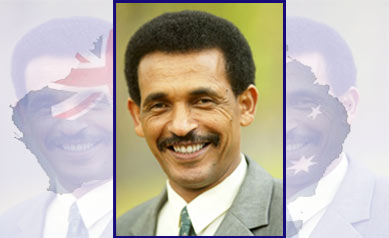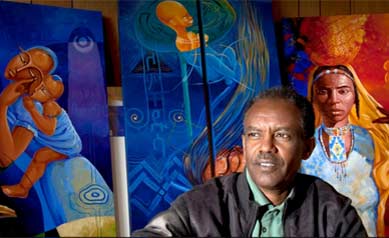A Chat With Prof. Kjetil Tronvoll
On October 22nd, Professor Kjetil Tronvoll’s report, ‘The Lasting Struggle for Freedom in Eritrea’ was presented by the Oslo Center for Peace and Human Rights (OCPHR) at a seminar held at Håndverkeren in Oslo, Norway. The report, which was commissioned by OCPHR, was the result of two years of preparation by Mr. Tronvoll.
Former Norwegian Prime Minister and now the president of the Center, Kjell Magne Bondevik, opened the conference which was attended by more than 100 people including Eritreans.
Mr. Bondevik stated that “the violations of human rights in Eritrea were very serious and have to be brought to light.” Mr. Bonevik also indicated the center held meetings with, “the Ministry of Foreign Affairs in Norway, the State Department and Congress in the USA to highlight the report.” He added that he is planning “to do the same in the UN, African Union and in the UN Human Rights Commission in Geneva.”
According to Mr. Bodevik, “the international community needs to be involved in the forgotten situation in Eritrea and the country must be brought out from its isolation.”
Prof. Tronvoll’s comprehensive report provides an extensive insight into the causes and the current human right situation in Eritrea. Eritreans activists hope that concerned international entities get more serious in dealing with the violations of the Eritrean government. So far, the West in general has been undermining efforts to resolve the situation by insisting on appeasing the Eritrean government in the hope of engaging it.
Professor Tronvoll: A True Eritrean Friend
The origin of Professor Tronvoll’s interest in Eritrea was entirely coincidental. In the 1980s, he was looking for a suitable place for his dissertation fieldwork in social anthropology. Specifically, he was looking for “a society as different as possible from the Norwegian one I had grown up in.” This meant looking for a “a society at war, exposed to hunger and famine.” He considered a few but the “Eritrean case came forward as the most suitable” due to its “liberation ideology…and possibility of undertaking qualitative fieldwork in the liberated areas in relative safety.” In 1989 he asked the EPLF for permission to travel to Sahel in Eritrea but had to wait because of the wars. In August 1991 he entered liberated Eritrea becoming the first foreign researcher to access liberated Eritrea.
After 20 months (1991-1993) of research, he authored “Mai Weini: A Highland Village In Eritrea” (Red Sea Press, 1998.)
Having chosen Eritrea solely for its academic merits, Prof. Tronvoll told awate.com that he “was never any EPLF solidarity worker,” though he supported Eritrean independence. He also said that he “did not work through EPLF interpreters or networks.” By doing so, he “gained access to a discourse which was balanced and at times critical to EPLF even in 1991-93 period.” Mr Tronvoll was also the “first researcher reporting and writing on EPLF’s forced recruitment strategies during the liberation war.”
Prof. Tronvoll visited Eritrea for follow-up fieldwork several times during the 1993-98 period. He visited Eritrea in 1998 after the outbreak of the 1998-2000 war, “doing research for the book I co-wrote with Tekeste Negash: ‘Brothers at War: Making Sense of the Eritrean-Ethiopian War” (Oxford, 2000.) Since then, his attempts to get a permit to continue research in the country have been in vain.
Prof. Tronvoll said that he “employed a multiple methodological approach” to prepare his report. He explained:
“…we have been open towards Persident Isaias and asked him for permission to come to Eritrea to do interviews with the government, in order to hear their opinion and explanation about the human rights situation. Although we have addressed him through official channels (the Eritrean Embassy in Stockholm), we did not receive any reply to our requests. Regime voices are thus taken from interviews given to national and international media, and other public statements made by the regime.
We had 2 research assistance doing extensive search on human rights in Eritrea through all open access sources in the UN system (treaty bodies, organisations, UNSC, etc), all international NGO reports, media, academic books and articles, human rights reports, etc. In total, we gathered about 20 folders full of information.
In addition, we have interviewed a number of individuals—Eritreans and foreign observes of Eritrea—in several locations. Additionally, we have made field-trips to the refugee camps in Kassala, Sudan and Shimelba in Ethiopia, to talk to Eritreans who recently fled the country. I have also drawn on my research in the country throughout the 1990s.
Prof. Tronvoll hopes the “the book would create awareness about the human rights situation in Eritrea among international actors and bodies. In international discourse, Eritrea is only focused upon as a regional spoiler, and the internal problems are overlooked and forgotten.” He hopes to correct the focus. He also hopes that, “the book contributes to debates within the Eritrean Diaspora to create the necessary popular and public demands for accountability and human rights respect in Eritrea.”
The book differs from other conventional Human Right studies from AI or HRW, as it tries to adopt an analytical approach to the study of HR development trends in Eritrea. It explains how and why the Eritrean regime became one of the worst human rights abusers in the world.
Though it is difficult to say what were the most striking facts uncovered in the course of the research, Prof. Tronvol said, “the gravest personal impression on me were interviews conducted with refugees in Sudan and Ethiopia, when some explained to me that they actually had a better life during the Derg than under EPLF today; that even the Derg was not as gruesome and abusive as their own liberation heroes, Issaias and his accomplices—and this was stated by individuals who had fought during the liberation war in EPLF.”
Prof. Tronvoll hope that the international decision makers will receive the information provided in the book with the interest to do something about the situation in Eritrea. He also hopes that the book would help “put Eritrea on the international agenda with full force and to stop viewing it only as a destructive force in the region, but to address the true concerns of the Eritrean people—internal human rights and humanitarian issues.”
While following up on his research on human rights and political development in Eritrea, Prof. Tronvoll is “awaiting a new political situation which will allow [him] to go and do more research in Eritrea and to revisit friends I have not seen for a decade.”
He advises Diaspora Eritreans “as individuals and collectives, to take a stand on the issue of human rights within their country.” He also advises “the many willing and unwilling regime collaborators to listen to their conscience and ask whether they truly can support such a terrible human rights abusing regime.”
The Eritreans regime has successfully created the perception that dissent is equal to treason. It seems Prof. Tronvol has observed that situation properly when he advises the supporters of the regime “to work for the improvement and respect of human rights and democracy – this is NOT treason but the duty of all Eritreans; it is what the liberation war was about: to establish a democratic independent Eritrea.”
Tronvoll seems to have recognized both the weakness and the potential of Eritreans when he said, “the Eritrean Diaspora has to unite in demanding changes in the country—together you are a formidable force. But—as it appears today—you are fragmented, weak and rather quiescent.”
Friends and interested parties can only help and expose the brutalities that the regime is committing on Eritreans, “but is the responsibility of Eritreans to change the development path of their country and to create a truly sovereign country—a sovereignty that is now held hostage by President Issaias and his top military and political leadership. Sovereignty has to rest whit the Eritrean people, so they can freely chose their own political leaders within a peaceful system that respects human rights.”
For further reading:
Download the report from this link: The Lasting Struggle for Freedom in Eritrea
More information: http://www.oslocenter.no/
‘Aftenpoften’ coverage (A major Norwegian daily: ‘Even children are imprisoned in Eritrea without law and trial’
Mr. Tronvoll is a respected friend of Eritrea who has several serious research papers about the country. His latest report, ‘The Lasting Struggle for Freedom in Eritrea’ had over 7500 hits in the few weeks it was available at awate.com in PDF format.



Awate Forum